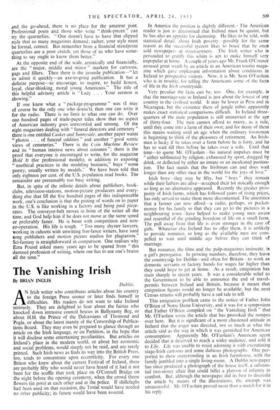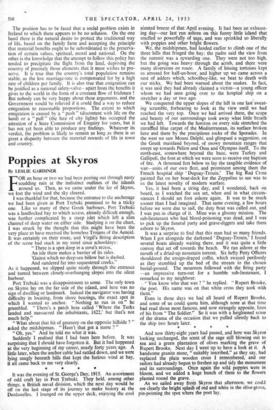The Vanishing Irish
By BRIAN INGLIS Dublin.
AN Irish writer who contributes articles about his country to the foreign Press sooner or later finds himself in difficulties. His readers do not want to take Ireland seriously. They are delighted to hear about the fairies who knocked down intrusive council houses in Ballynanty Beg, or about H.H. the Prince of the Dalcassians of Thomond and Pogla, or about the latest inanity of the Censorship of Publica- tions Board. They may even be prepared to glance through an article on the Irish language, or on Partition, in the hope that it will disclose some entertaining peculiarities. But articles on Ireland's place in the modern world, or about her economic and social problems, would simply not be read, and are rarely printed. Such Irish news as finds its way into the British Press, too, tends to concentrate upon eccentricity. For every one Briton who knew about the current Festival of Ireland, there are-probably fifty who would never have heard of it had it not been for the scuffle that took place on O'Connell Bridge on the night before the opening ceremony, when the crowd threw flowers (in pots) at each other and at the police. If shillelaghs had been used on that occasion, the Tostal would have needed no other publicity; its future would have been assured. In America the position is slightly different. - The American reader is just as determined that Ireland must be quaint, but he has also an appetite for slumming. He likes to be told, with statistical detail. about Irish poverty--possibly for the same reason as the successful tycoon likes to boast that he once sold newspapers at street-corners. The Irish writer who is persuaded to gratify this whim is apt to make himself very unpopular at home. A couple of years ago Mr. Frank O'Connor aroused great wrath by an article in an American tourist maga- zine which gave unpleasant information about conditions in Ireland to prospective visitors. Now, it is Mr. Sean O'Faolain who is in trouble. for telling the Americans some of the facts of life in the Irish countryside.
Very peculiar the facts can be. too. One, for example, is that the marriage-rate in Ireland is just about the lowest of any country in the civilised world. It may be lower in Peru and in Nicaragua, but the existence there of jungle tribes apparently makes exact statistical comparisons difficult. In Ireland three- quarters of the male population is still unmarried at the age of thirty-four. The men cannot afford to marry, as a rule. until they come into a farm of their own; and for many of them this means waiting until an age when the ordinary townsman is beginning to think of the pleasures of retirement. An Irish- man is lucky if he takes over a farm before he is forty, and he has to wait till then before he takes over a wife. Until that time—to quote Mr. O'Faolain—his natural impulses must be " either sublimated by religion, exhausted by sport, drugged by drink, or deflected by either an innate or an inculcated puritan- ism. The fact stands that the Irishman can and does wait longer than any other race in the world for the joys of love."
Irish boys—they may be fifty, but " boys " they remain while their fathers are alive—accepted their lot stoically enough so long as no alternative appeared. Recently the greater pros- perity of Irish farms, which has followed years of rising prices. has only served to make them more discontented. The amenities that a farmer can now afford—a radio, perhaps, or pocket- money for his family so that they can go to the pictures in a neighbouring town—have helped to make young men aware and resentful of the grinding boredom of life on a small farm. The pull away from that life is even stronger in the case of girls. Whatever else Ireland has to offer them, it is unlikely to provide romance, so long as the available men are com- pelled to wait until middle age before they can think of marriage.
But romance, the films and the pulp-magazines insinuate, is a girl's prerogative. In growing numbers, therefore, they leave the countryside for Dublin—and often for Britain—to work as domestic servants or factory hands for wages far higher than they could hope to get at home. As a result, emigration has risen sharply in recent years. It was a considerable relief to the Government to be able to announce the end of travel- permits between Ireland and Britain, because it meant that emigration figures would no longer be available; but the next Census returns will probably have a sad tale to tell.
This emigration problem came to the notice of Father John O'Brien of Notre Dame University. and it was for a symposium that Father O'Brien compiled on " the Vanishing Irish " that Mr. O'Faolain wrote the article that has provoked the rumpus over here. But it is significant of a more chastened attitude in Ireland that the anger was directed, not so much at what the article said as the way in which it was garnished for American consumption. Apparently Mr. O'Faolain's American agent decided that it deserved to reach a wider audience, and sold it to Life. Life was unable to resist adorning it with excrutiating stage-Irish cartoons and some dubious photographs. One pur- ported to show overcrowding in an Irish farmhouse, with the family jumbled into a single living-room. A Dublin newspaper has since produced a photograph of the house itself, a substan- tial two-storey affair that could billet a platoon of infantry in comfort. But. although the newspaper did its best to discredit the article by means of the illustrations, the attempt was unsuccessful. Mr. O'Faolain proved more than a match for it in his reply. The position has to be faced that a social problem exists in Ireland to which there appears to be no solution. On the one hand there is the natural desire to protect the traditional way of life, based on the family farm and accepting the principle that material benefits ought to be subordinated to the preserva- tion of certain values, spiritual, moral and national. On the other is the knowledge that the attempt to follow this policy has tended to precipitate the flight from the land, depriving the country of precisely those elements that it most wishes to pre- serve. It is true that the country's total population remains stable, as the low marriage-rate is compensated for by a high rate of children per family. It is also true that emigration can be justified as a national safety-valve—apart from the benefits it gives to the world in the form of a' constant flow of Irishmen ! But nobody can be very happy about these arguments, and the Government would be relieved if it could find a way to reduce emigration to reasonable proportions. The extent to which emigration is caused by a push " (discontent with life on the land) or a " pull " (the lure of city lights) has occupied the attention of a State Commission of Enquiry for years, but it has not yet been able to produce any findings. Whatever its verdict, the problem is likely to remain as long ,as there is so great a disparity between the material rewards of life in town and country.



































 Previous page
Previous page